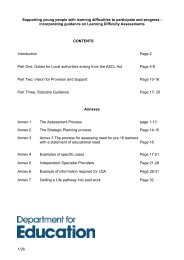Research Brief - Department for Education
Research Brief - Department for Education
Research Brief - Department for Education
You also want an ePaper? Increase the reach of your titles
YUMPU automatically turns print PDFs into web optimized ePapers that Google loves.
school that does not result from a school closure,<br />
amalgamation, or transfer across phases of<br />
schooling, and about a fifth of the EPPE 3-11 pupil<br />
sample were mobile in this way during KS2 (age<br />
7-11). Mobility in the KS2 period predicts lower<br />
levels of Mathematics attainment after controlling<br />
<strong>for</strong> background characteristics (ES=-0.27), but not<br />
significantly so with English.<br />
In addition, KS2 mobility and particularly if a pupil<br />
changed schools during both KS1 and KS2,<br />
predicted later poorer social/behavioural outcomes<br />
in Year 6: lower levels of ‘Self-regulation’ (ES=-<br />
0.28) and ‘Pro-social’ behaviour (ES=-0.35) and<br />
higher levels of ‘Hyperactivity’ (ES=0.32) and ‘Antisocial’<br />
behaviour (ES=0.48). However, as with<br />
most educational research these results do not<br />
show whether or not KS1 and/or KS2 mobility itself<br />
causes poorer social/behavioural outcomes; rather<br />
it shows that mobility during primary school<br />
predicts lower scores on later outcome<br />
assessments. It may be that awareness of<br />
problems prompts parents to move their children.<br />
For a detailed description on mobility during preschool,<br />
KS1 and KS2 please see the separate<br />
report by Melhuish et al. (2008b).<br />
‘Out of school hours learning (OSHL)’<br />
OSHL covers any learning experience or activities<br />
pupils engaged in out of school hours (e.g. sports<br />
classes, music tuition, religious groups and extra<br />
subject tuition). EPPE 3-11 identified a consistent<br />
positive relationship between both parents’<br />
educational level and ‘Out of school hours<br />
learning’. Engagement in any OSHL activity<br />
predicted better progress in English (ES=0.20) and<br />
Mathematics (ES=0.17) at age 11, after controlling<br />
<strong>for</strong> background factors. As there is a relationship<br />
between SES and OSHL this may partially<br />
contribute to SES differences in educational<br />
attainment, reported in this study and elsewhere.<br />
Term of birth (summer born children)<br />
Differences in pupil attainment were identified in<br />
terms of pupils’ age in relation to their classmates.<br />
The younger the pupil (in their academic year i.e.<br />
summer born) the poorer their attainment tends to<br />
be, compared to the older pupils, and summerborn<br />
pupils are 10-18% more likely to be<br />
designated as having SEN. Overall summer born<br />
children showed poorer attainment outcomes in<br />
both English (ES=-0.29) and Mathematics (ES=-<br />
0.33).<br />
Transition to Secondary School<br />
A poor transition to secondary school can itself<br />
become a barrier to future success (see the linked<br />
sub-study by Evangelou et al., 2008). To ensure<br />
that children’s transitions are successful, social<br />
adjustment, institutional adjustment and curriculum<br />
interest and continuity all need to be taken into<br />
account when planning transition strategies.<br />
Some implications of EPPE 3-11<br />
EPPE 3-11 has highlighted the importance of large<br />
scale, longitudinal studies using a mixed methods<br />
approach (Sammons et al., 2005; Siraj-Blatch<strong>for</strong>d<br />
et al., 2006) <strong>for</strong> studying how different phases of<br />
education interact with one another. There are<br />
many implications of the findings <strong>for</strong> policy and<br />
practice. These include the importance of<br />
enhancing the quality of pre-school; supporting<br />
parents as educators as well as carers; additional<br />
support <strong>for</strong> disadvantaged children; developing<br />
positive relationships between academic and<br />
socio-emotional outcomes; and treating health,<br />
education and care as inseparable (Melhuish et<br />
al., 2008b; Sylva et al., 2007; Siraj-Blatch<strong>for</strong>d et<br />
al., 2008). In addition the evidence supports the<br />
case <strong>for</strong> universal provision of good quality preschool<br />
(Melhuish et al., 2008c).<br />
The results clearly demonstrate the importance of<br />
investment in early years; especially <strong>for</strong> children<br />
from disadvantaged backgrounds and those who<br />
go on to primary education of poorer quality, while<br />
also showing that pre-school is not a magic bullet.<br />
The research has provided a unique insight into<br />
the enduring impact of early experiences,<br />
especially the Early years HLE and the quality of<br />
pre-school. It also shows the importance of the<br />
primary school attended, especially its academic<br />
effectiveness. At primary school, EPPE 3-11 has<br />
drawn attention to the importance of how<br />
classroom practices relate to the overall climate of<br />
the school, which has often been missing in earlier<br />
school effectiveness studies. It confirms the<br />
importance of the overall quality of teaching <strong>for</strong><br />
academic progress. The project has also revealed<br />
that the relationship between disadvantage and<br />
educational experience is complex and that<br />
multiple disadvantages interact and are key<br />
sources of inequality.<br />
The case study evidence supports the policy focus<br />
on initiatives that provide family and/or child<br />
mentoring (e.g. Learning Mentorship) as these<br />
may have a strong role in supporting the<br />
development of social capital. Community<br />
focused supplementary schools and classes can<br />
provide important educational resources. Schools<br />
and pre-schools need to encourage the<br />
involvement of parents and the wider family,<br />
particularly in the education of disadvantaged<br />
children.
















